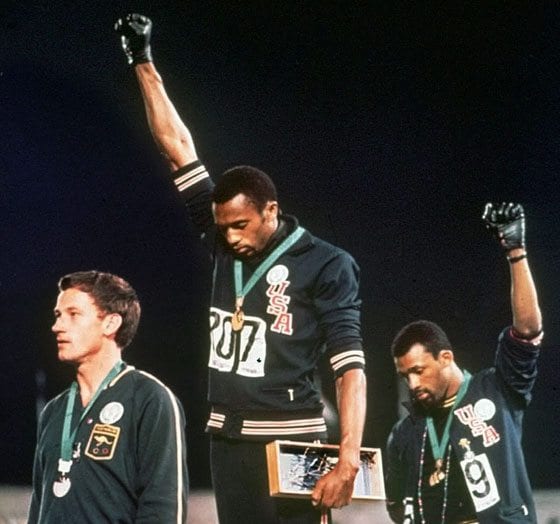
For the past 25 years, Northeastern University’s Sport in Society center has worked to use sports as a tool for improving communities. After a successful test run earlier this year, the organization will bring its mission to the masses this fall using a new medium— television.
The center made its initial foray into cable TV in February with the pilot episode of “Sport in Society,” a half-hour-long documentary-style program that aired on the New England Sports Network (NESN).
The pilot expanded on the Sport in Society True Heroes of Sport Awards Gala, held in January. At the event, Tommie Smith and John Carlos were inducted into the Sport in Society Hall of Fame, joining such notables as Boston Celtics legend Bill Russell and tennis trailblazers Arthur Ashe and Althea Gibson. Smith and Carlos were the two sprinters who raised their fists in a “Black Power salute” as they received gold and bronze medals, respectively, at the 1968 Summer Olympics in Mexico City.
“We are looking to highlight Sport in Society programs to push and underscore the message of the Sport in Society center,” said Sport in Society Executive Director Dan Lebowitz.
During the awards gala, Lebowitz was approached by Tom Souza, founder and CEO of USA World Events and an independent producer for NESN. Impressed with Sport in Society’s work, Souza suggested that the center use TV as a vehicle to further its outreach.
“I asked Dan: Why don’t you take some of these functions and publicize them on TV?” said Souza.
The opportunity made sense not only for the center, but also for NESN, which at the time had no programs addressing sports’ positive effect on society. The collaboration also seemed to have struck viewers — when the “Sport in Society” pilot re-aired in April, it ranked third in overall viewership that month, according to NESN ratings statistics, trailing only Celtics and Bruins games.
Because of that warm reception, more episodes are now being shot, with plans for NESN to air them starting in September.
“NESN producers have been present at our events since May and are currently working on putting together the next episode,” said Lebowitz.
One of those events was the center’s Human Rights Leadership Forum, held May 6. The forum gathered over 300 student-athletes, instructing them in ways that they can act as leaders, through sports, to fight for social justice. The theme of the forum, “Rhythm and Flow,” aligns with the center’s latest campaign to study the connections between sport and music as it tries to affect social change.
“We are … in the process of getting footage of Sport in Society events that matches up with the core themes of sports medicine and corporate responsibility,” said Souza.
With the idea that sports can be used to move society forward, Souza and “Sport in Society” host Eric Frede met with Lebowitz to structure and format the show to best reflect the center’s mission.
“We live in a diverse society and we need to move from tolerating diversity to celebrating it,” said Lebowitz.
The format used for the show — an amalgam of documentary video and live interviews — was chosen to stress the importance of the subject matter.
The pilot combined single- and two-shot camera angles to capture live interviews and included file footage of the gala, as well as the famed 1968 medal ceremony in Mexico City. It maintains a historically objective view of Smith and Carlos’ action, allowing the two runners to explain in their own words the significance of their gesture.
“We wanted the framework [of the show] to be peaceful and content-oriented,” said Lebowitz. “Hopefully, when people watch the show, they will pick up on the intent of the message.”
As the show moves forward, new and different topics will come into focus. “We create a new and different theme around each show,” said Souza.
Lebowitz is looking forward to introducing some of the center’s programs as themes for future “Sport in Society” episodes. One in particular: Mentors in Violence Prevention, which encourages students to speak up and take action in preventing problems that historically have been considered “women’s issues,” like rape, battery and sexual assault.
For more information about Sport in Society, their programs and the television program, visit http://www.northeastern.edu/sportinsociety.






